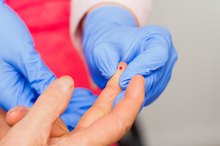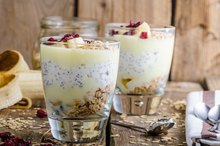How to Remove Sugar From Your System
Sugar is everywhere. You can find it in everything from dairy products to sauces to canned foods. If you’re trying to eliminate sugar from your life, you will need to do more than just give up sweets. Aside from changes in your diet, try exercising daily. Since you get your energy from sugar, exercising will help you burn the sugar in your blood. If you don’t replace it by eating carbs again right after your workout, you’ll be removing sugar from your blood successfully.
Read the nutrition labels of the foods you buy frequently. Either eliminate anything that contains added sugars or compare similar products and choose the one with the lowest sugar content. According to the Children’s Hospital Boston, every 4 g of sugar equal 1 tsp 1. The recommended intake of sugar is no more than 6 tsp. a day, so keep that in mind when choosing products to eat.
How to Get a Sugar Rush
Learn More
Switch to whole grains. While all carbohydrates are converted into glucose by your body, whole grains go through the process much more slowly. This means you’ll have time to burn off that sugar, rather than have it around or store it as fat. Get rid of refined grains and carbs like white rice, white sugar, sugary cereals and sweets. Instead, opt for brown or wild rice, whole wheat bread and pasta and plain oats.
Reduce your overall carb intake. Since sugar comes from carbs, cutting your overall carb intake will help you clear sugars from your system. According to Wilstar, a low-carb diet is any diet where you eat fewer than 100 g per day. However, some diets like Atkins cut down your carb intake to no more than 20 g per day.
Related Articles
References
- Children’s Hospital Boston: Reading Nutrition Facts Labels and Food Shopping Tips
- “The Sugar Addict's Total Recovery Program”; Kathleen DesMaisons Ph.D.; Ballantine Books; 2000
- U.S. Department of Health and Human Services and U.S. Department of Agriculture. 2015–2020 Dietary Guidelines for Americans. 8th Edition. 2015.
- Rippe JM, Angelopoulos TJ. Sucrose, High-Fructose Corn Syrup, and Fructose, Their Metabolism and Potential Health Effects: What Do We Really Know? Adv Nutr. 2013;4(2):236-245. doi:10.3945/an.112.002824
- U.S. Department of Agriculture. Cut Down on Added Sugars. 2016.
- Rampersaud GC, Kim H, Gao Z, House LA. Knowledge, perceptions, and behaviors of adults concerning nonalcoholic beverages suggest some lack of comprehension related to sugars. Nutr Res. 2014;34(2):134-142. doi:10.1016/j.nutres.2013.11.004
- Tandel KR. Sugar substitutes: Health controversy over perceived benefits. J Pharmacol Pharmacother. 2011;2(4):236-243. doi:10.4103/0976-500X.85936
- Bray GA. Energy and Fructose From Beverages Sweetened With Sugar or High-Fructose Corn Syrup Pose a Health Risk for Some People. Adv Nutr. 2013;4(2):220-225. doi:10.3945/an.112.002816
- American Dental Association. American Dental Association Encouraged by Soda Makers’ Pledge to Promote Smaller Sizes, Less Sugar. 2014.
- U.S. Department of Health and Human Services and U.S. Department of Agriculture. 2015–2020 Dietary Guidelines for Americans. 8th Edition. 2015.
Writer Bio
Tammy Dray has been writing since 1996. She specializes in health, wellness and travel topics and has credits in various publications including Woman's Day, Marie Claire, Adirondack Life and Self. She is also a seasoned independent traveler and a certified personal trainer and nutrition consultant. Dray is pursuing a criminal justice degree at Penn Foster College.









